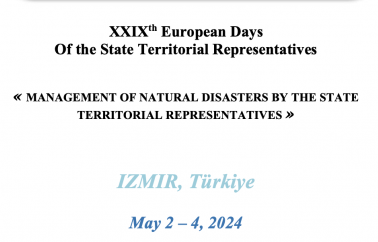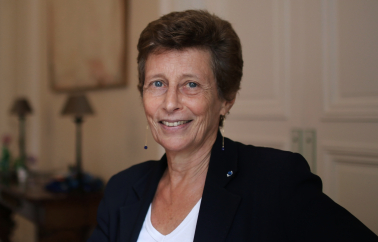
Feedback from Mr. BEDÜK, President of Turkish Association of Governors, regarding the COVID19 crisis management
FIGHT AGAINST CORONAVIRUS (COVID-19) PANDEMIC IN TURKEY
Saffet Arıkan BEDÜK[1]-Selim ÇAPAR[2]
Introduction
The 2019-20 coronavirus (Covid-19) pandemic was first spotted in Wuhan City, the capital of China's Hubei Province, on December 1, 2019. It became a global epidemic in a short period of time, following a rapid spread. The World Health Organization declared a global pandemic on March 11, 2020.
This virus outbreak was carefully watched in Turkey. The first case was detected on March 11, 2020. The first loss of life was recorded on March 17, 2020. A number of measures were taken such as closing of borders, banning of flights, quarantine practices, banning of public places and activities, and interrupting of education. Public support for these measures was provided.
In Turkey the measures were taken effectively by the executive power, which is represented by the President in the central government. In this process, the Ministry of Health has come to the fore on the preparation of the health infrastructure, following the cases, and recommending the measures to be taken as The Ministry of Interior on the issue of publication and monitoring of measures in the context of the protection of public order. In the process that is effectively managed by the President, the Ministry of Treasury and Finance has taken an important role in the declaration of economic support packages as the Ministry of Family, Labor and Social Security in providing social relief support and the Ministry of National Education in maintaining the education on virtual environment. Other ministries have also supported the campaign within their mandate. The legislative power has fulfilled its responsibilities by enacting laws regarding the epidemic as the judicial power in the postponement of non-urgent trials.
The implementation and follow-up of the measures taken by the central administration under the coordination of governors throughout the country was carried out. Governors, acting as the representatives of the central government in 81 provinces and 922 districts in Turkish public administration system, are responsible for the management of crisis and emergencies. Governors and district governors serve as the head of the province and district administration. Governors also took the roles of transferring, coordinating and controlling the measures in practice as “lifeguards” in the fight against widespread epidemics.
In this study, the functioning of fight against coronavirus pandemic of Turkey in the center and in the provinces will be examined briefly.
1. DUTIES AND RESPONSIBILITIES OF THE STATE
Article 5 of the Republic of Turkey Constitution imposed on the State the duty of "ensuring peace, prosperity and happiness of individuals and society, protecting the fundamental rights and freedoms of the person, independence and integrity of the nation, indivisibility of the country, the Republic and democracy".
According to the Constitution Article 56 "The State, regulates the central planning and service of health care institutions, with the purpose of providing for everyone to live with the continuation of physical and mental health, performing the cooperation by increasing the saving and efficiency of human and material power.
In the first article of the Public Sanitary Law No. 1593, there is a provision as "It is one of the public services to correct the sanitary conditions of the country and to fight against all illnesses or miscellaneous agents that harm the health of the nation, and to ensure that the future generation grows well, and to take the people to medical and social counsel."
The Law No. 1593 envisaged the establishment of "public sanitation boards" with a participatory approach, including mayors and provincial and district health managers, under the chairmanship of governors and district governors in provinces and districts. The task of these boards is to ensure that necessary decisions are taken and implemented in the field of health.
2. COORDINATION AND COOPERATION IN CENTRAL ADMINISTRATION
With the transition to Presidential Government System in Turkey in 2018, executive power is vested in Presidential mandate. Thus, the ministries, policy boards and other institutions created were envisaged to work effectively under the coordination of the President. In this context, with the Circular No. 2020/2 published by President Erdoğan in the Official Gazette dated March 13, 2020 and numbered 31067, a restriction was imposed on the “travel of public servants abroad”.
With the document numbered 12362 dated 13 March 2020, the Presidency Administrative Affairs Department sent a letter on “administrative leave”. In the work of public servants, the personnel that need to be taken for administrative permission and the intensity reduction are regulated. In addition, education was postponed at primary, secondary and high school and higher education institutions. In this process, distant education applications were introduced.
In the process of fighting against the pandemic, measures were rapidly implemented in line with the recommendations of the Ministry of Health and the Scientific Committee and the instructions of the President. The implementation of measures in the fields related to public order and security was generally through the Ministry of Interior. Thus, in the process of fighting against the pandemic, the Ministry of Health and the Ministry of Interior came to the fore. In addition, each ministry, including the Ministry of Treasury and Finance in the implementation of economic measures; the Ministry of Family Labor and Social Security in the provision of social relief support; and the Ministry of Education in surceasing the education and transition to virtual education; supported the process in matters related to their field of duty.
On the other hand, the Turkish Grand National Assembly continued to work as a legislative body and made legislative amendments on the issues necessary to fight against the pandemic. The activities of the judicial body have been reduced, and hearings that do not require urgency have been postponed to reduce social isolation and contact.
During the fight against the pandemic, the President regularly informed the public through his speeches to the nation. It was announced by the President that masks could not be sold in the country and masks would be given by the State. It is also explained that treatments for Covid-19 will be free for people living in the country.
2.1. Ministry of Health
With the Decree Law No. 663, the organization, duties, powers and responsibilities of the Ministry of Health and its affiliates have been regulated. The duty of the Ministry; is to ensure that everyone lives in complete physical, mental and social well-being.
The Ministry of Health continues to fight against the pandemic within the scope of its duties and responsibilities given by the Constitution and laws and especially on the basis of the "Pandemic Influenza National Preparation Plan" published in 2019. In this context, the Ministry has established a “Scientific Committee” at the national level, developments regarding the pandemic are carefully monitored and recommendations are created by this board. With the “Operation Center” established within the Ministry, works, processes and developments related to the pandemic are monitored throughout the country. At the provincial level, the process is managed with the “Provincial Pandemic Coordination Boards” established under the chairmanship of the governor or deputy governor. Within the scope of the organization of the Ministry, the contact environment of the detected cases is followed by the filiation teams in the provinces and districts.
The hospitals within Turkey that belongs to state, universities or private owners, are prepared by Ministry of Health in the context of fight against the pandemic. In critical areas such as the number of hospitals the country has, the number of hospital beds, the number of intensive care beds, the number of respiratory devices, capacity has been increased with the measures taken. Rapid action was taken on the provision of medical devices and drugs for the diagnosis and treatment of the pandemic. Thus, Turkey, with the health care system, has reached to the status of meeting the pandemic effectively.
The first case was detected in Turkey on March 11, 2020. The first loss of life was recorded on March 17, 2020. On 25 April 2020, the total number of cases was recorded as 107.773 and the number of people who died was 2.706. Turkey seems very successful on the detection and treatment of cases.
During the fight against the pandemic, the public was regularly informed by the Minister of Health and members of the Science Board.
On the other hand, the Public Sanitary Law No. 1593 places important duties, powers and responsibilities to the Ministry, governors and district governors in managing the process.
Turkey has met the Covid-19 pandemic with a strong health care infrastructure (hospitals and health institutions) and well-trained health care personnel. Within the fight against pandemic, the role of all health care personnel, especially the Minister of Health performing their duties devotedly has a great importance. On the other hand, in this fight, health care personnel have always been supported by the central administration, provincial governors and local administrations.
2.2. Ministry of Interior
The Ministry of Internal Affairs is an institution directly related to the social life with the main duties it undertakes. For this reason, it took an active role in the fight against the pandemic.
With the Presidency Decree No. 1 within the state agency, “providing internal security and law enforcement” and “protecting public order” are among the duties of the Ministry of Interior. The Ministry of Interior carries out these duties through its "affiliated" institutions, the General Directorate of Security, the Gendarmerie General Command and the Coast Guard Command.
There are also units within the Ministry of Interior for the management of crises and emergencies. The Security and Emergency Situations Coordination Center (GAMER) is the central unit of the Ministry. The Directorate of Disaster and Emergency Management (AFAD), which takes the responsibility of disaster management in the country, continues its duties as an "affiliated" institution to the Ministry of Interior.
In line with the mission of the General Directorate of Provincial Administration of the Ministry of the Interior, it has come to the fore in the effective management of the fight against the pandemic. The General Directorate of Provincial Administration has undertaken important duties and responsibilities in sending measures taken throughout the country and circulars for the implementation of these measures. Law enforcement institutions, AFAD and GAMER has undertaken important duties and responsibilities in the execution and monitoring of the measures taken.
As of March 13, 2020, the Ministry of Internal Affairs issued circulars on taking and implementing measures in a dynamic process. These circulars stands within a wide range from cancellation of meetings and ceremonies, referral and transfer of convicts and detainees, prevention of exorbitant prices in critical products to the closure of public entertainment and resting places, travel in transportation vehicles, transportation of agricultural workers, care of street animals, travel bans, curfews.
On the other hand, these circulars were published in accordance with the spirit of the Presidential Government System and the fight against the coronavirus pandemic and in line with the recommendations of the Ministry of Health and Science Board and the instructions of the President. This important point is clearly stated throughout the circulars.
3. COORDINATION AND COOPERATION IN PROVINCES AND DISTRICTS
The provincial administration system, which is based on a deep-rooted state tradition, took its final form legally with the Provincial Administration Law No. 5442 enacted in 1949. Unlike other professions, the provincial administration, which undertakes the functioning and coordination of public institutions in ordinary situations and undertakes the function of “lifeguard in extraordinary situations”, is a profession group based on the effective use of leadership skills on affiliated institutions and organizations and the staff working in these units. It is also a critical duty that requires effective and continuous coordination with other units such as local governments, civil society and the private sector. Provincial administrators are in a highly strategic position in the implementation of the decisions, which are taken in the center, throughout the country, ensuring coordination and supervision.
For this extent, the head of the provincial general government is the governor, and the governor appointed by the President acts as the representative and administrative executive of the State and the President in the province.
Circulars and instructions published by the central administration are put into practice under the leadership of the governors in the province within the scope of fighting against the pandemic. In this regard, the provincial general hygiene board, the provincial administrative board and the provincial pandemic coordination board, which are held under the chairmanship of the governor, take decisions, within the direction of central government, and implement them for provincial practices.
In this context, establishing of “fidelity support organization” and keeping it operational in order to meet the needs and demands of the curfew-applied age groups (0-20 years old and those over the age of 65 or who have chronic illness), as well as controlling of the curfews by law enforcement forces are planned and implemented by the governorships in the province. The control of travel bans and the issuance of travel permit documents are coordinated by the governorships. Travels, working and living conditions of seasonal agricultural workers are kept under surveillance by the governorships.
Health care institutions and personnel in the province are working under the supervision and control of the governor and in the front line in fight against the pandemic. Governors are also involved in the solution of the problems faced by health care personnel.
Similar to the establishment in the provinces, the district governors are also the head of the district administration. The district governor, who is responsible for the general administration of the district, is appointed by the President and serves as the representative and administrative executive of the President in the district. It is responsible for organizing and supervising the general administration and operation of the district under the supervision and control of the governor.
Taking and implementing decisions regarding the implementation of circulars and instructions from the central government and governorship, such as the practices in the province, are carried out under the duties and responsibilities of the district governors. In this regard, the authorized district hygiene board and district administrative boards meet under the chairmanship of the district governor.
Governors in provinces and districts executes the fight against the pandemic as the only public servants providing cooperation and coordination with the central administrative organization in the province and district (for example, provincial and district health directorates work under the governor and district governor), local administrations, non-governmental organizations and the private sector. Provincial governors also give duties and responsibilities in this matter to the village and neighborhood reeves elected.
Turkey is high in districts where Quarantine measures are applied in the districts across Turkey, in which the numbers of cases are high. If the provincial and district sanitation boards are deemed necessary, a quarantine decision can be taken covering the district centers or districts, taking into account the numbers of contacts and cases. For example, quarantine measures are implemented in the district center of Artvin-Borcka and in the entire district of Adana-Tufanbeyli. In addition, it was decided to make the entrances and exits between districts in a controlled manner by the provincial public sanitation boards in Zonguldak and Sinop provinces.
In accordance with the decisions taken by the provincial and district sanitary boards, which were chaired by the local administrative officers, on April 10, 2020, quarantine measures were applied in total of 185 settlements, including 1 district, 1 district center, 6 towns, 102 villages, 65 neighborhoods and 10 hamlets within 54 provinces along our country, and 124,716 people were living under quarantine.
As of April 15, 2020, at 13.00, quarantine measures are applied in total of 227 settlements including 58 provinces, 3 districts, center of 2 districts, 6 towns, 85 neighborhoods, 115 villages and 16 hamlets. The total population in the settlements where the quarantine measures are applied is 251,726. On the other hand, quarantine decision was abolished in 41 residential areas in 14 provinces. However, on the same date, it was announced that there were a total of 12,912 people coming from abroad and kept in quarantine in student dormitories.
Although quarantine decisions are made for 14 days, they can be extended if needed depending on the developments. Quarantine measures are abolished in settlements that are observed to reach their goals. For this reason, the quarantined settlements change daily.
Coordination of the basic needs of people living in quarantined areas is also undertaken by the provincial governors.
Call centers and telephone numbers have been determined in order to effectively meet the basic needs, demands and requests of the people living in quarantined places and the age groups under curfews where the curfews are imposed. Efforts are directed to meet the needs effectively with fidelity support groups created in residential areas.
On the other hand, the requests of those who make exceptions within the travel restrictions can be made via e-government, from the call centers or by directly applying to the district governorships. Requests are evaluated and permission documents are issued for those deemed appropriate.
Social aids provided in the process of fighting against the pandemic are delivered to the relevant people by the Social Assistance and Solidarity Foundations established in provinces and districts, in which mayors are also members, and chaired by the provincial governors.
During the pandemic, a total mobilization was carried out in the provinces and districts under the coordination of the provincial governors. Provincial organizations of the central administration are directing the activities in cooperation with the local administrations (municipalities, special provincial administrations and villages), non-governmental organizations and the private sector with the support of the public.
Conclusion
In Turkey it is seen that an effective fight against the coronavirus (Covid-19) pandemic is given in a full-scale understanding with the support of the people within the Presidential Government System.
From the moment of the pandemic was seen in Turkey, measures are taken by both the Ministry of Health and the Ministry of Interior, in accordance with the recommendations of Ministry of Health and Science Committee, and the instructions of President Erdogan.
Many precautionary decisions were taken and implemented by the Ministry of Interior in order to manage the risk of the epidemic / contamination in terms of public health and public order, to ensure social isolation, to maintain social distance and to control the speed of its spread. Implementation, coordination and supervision of the measures taken by the central administration, is carried out by the boards under the chairmanship of the province and district governors.
In Turkey, Provincial administrators are the most powerful elements of administrative system, especially in managing the crisis and emergencies. In the global coronavirus pandemic, the decisions taken by the central administration are effectively implemented through the provincial governors with the board decisions taken at the provincial and district levels. In this way, the provincial governors are devotedly fulfilling their safeguard functions in extraordinary situations
In this context, in the fight against the pandemic, health care personnel in health institutions; gendarmerie, police, coast guard personnel in law enforcement forces; AFAD, GAMER, 112 personnel working in the emergency call centers and all the personnel working in the provincial administration of the central administration in emergency management, perform their duties in the coordination and management of the provincial governors.
References:
AFAD (2020) www.afad.gov.tr, (30.01.2020).
Çapar, S. (2011) “Kaymakam Adaylığına Giriş Süreci Üzerine Bir Değerlendirme”, Türk İdare Dergisi, Aralık 2011, Sayı: 473, 75-95.
Çapar, S. ve M. Yayla (2019) “Türkiye”, içinde Türkiye ve Komşu Ülkelerde Yönetim, Ed.: S. Çapar ve M. Yayla, Ankara: TİAV, 5-42.
GAMER (2020) https://www.icisleri.gov.tr/gamer/(30.01.2020).
İçişleri (2020) https://www.icisleri.gov.tr/(29.03.2020).
İçişleri Bakanlığı (2019) İçişleri Bakanlığının Yapısı ve Mülki İdare Çalıştayı Çalıştay Raporu, TİAV, Ankara.
İİGM, (2020) https://www.icisleri.gov.tr/illeridaresi/iller-idaresi-genel-mudurlugu-k...(29.03.2020).
Sağlık (2020) https://grip.gov.tr/depo/saglik-calisanlari/ulusal_pandemi_plani.pdf (29.03.2020).
[1] President of Turkish Association of Governors
[2] Associate Professor, Ministry of Interior, Head of GAMER/AREM Departments



